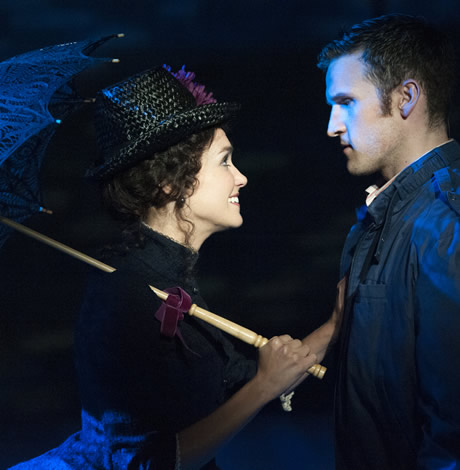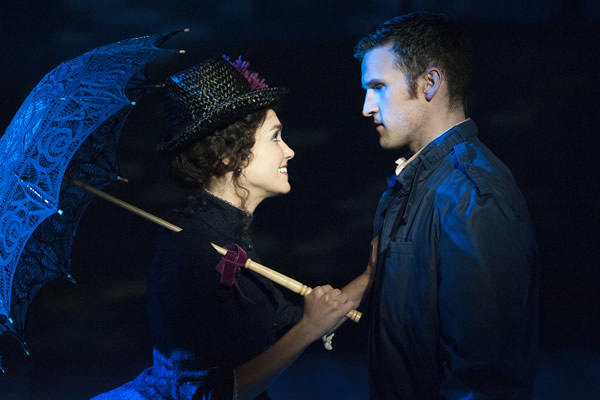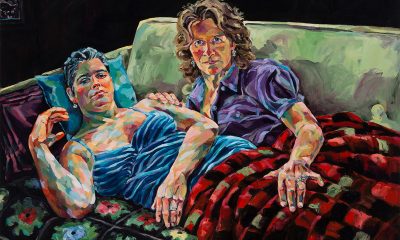Arts & Entertainment
No walk in the ‘Park’ for Claybourne Elder
George’ actor Elder on the rigors of artistic life


Brynn O’Malley as Dot and Claybourne Elder as George in ‘Sunday in the Park with George.’ (Photo by Margot Schulman; courtesy Signature Theatre)
‘Sunday in the Park with George’
Through Sept. 21
4200 Campbell Ave. Arlington
703-820-9771
At 32, Claybourne Elder is living the theater dream with a charmed career. The handsome out actor’s first big break came playing Hollis Bessemer, the young gay heir in the original off-Broadway production of Stephen Sondheim’s “Road Show” in 2008.
“I’d just moved to New York and went on an open chorus call never dreaming I’d be cast,” he says. “They asked me back and I got the part. Suddenly I was playing across from two actors I revere, Michael Cerveris and Alexander Gemignani, and Sondheim was sitting around drinking coffee and giving notes. It was unreal.”
Elder has worked nonstop ever since on Broadway and beyond, interpreting extant parts and creating roles like Clyde Barrow’s likable brother Buck in the Broadway musical “Bonnie & Clyde,” and aviator Charles Lindbergh in “Take Flight.” He played Ollie, a New Orleans prostitute in “One Arm,” Moisés Kaufman’s dramatic adaptation of Tennessee Williams’ same-titled short story and unfinished screenplay.
And now he’s tackling the part of George in Signature Theatre’s production of Stephen Sondheim and James Lapine’s wondrous musical “Sunday in the Park with George,” a role Elder has had his eye, and ear, on for a long time. The story focuses on the struggles of French painter Georges Seurat (called George in the musical). He’s surrounded by his lover Dot, and his masterpiece “A Sunday Afternoon on the Island of Le Grande Jatte” and those characters depicted in the painting. In the second act, George’s sculptor descendant (also named George and also played by Elder) strives to make sense of life, love and art in 1980s New York City.
For many musical theater lovers, “Sunday in the Park with George” holds a special place in the canon.
“It’s my favorite among all the children,” says Elder laughing. “It’s true. The show has so many universal themes. People connect to it in deep ways. It’s an emotionally charged theatrical event.”
“And my part is magically written,” he adds. “I couldn’t ask for a part written more perfectly in my range. I’m a tenor with a dash of baritone. My songs have lovely rich lower things and then go up high. It’s technically challenging but in a very pleasurable way, never needlessly challenging. Sondheim never writes music to impress. He doesn’t have to.”
Matthew Gardiner, the Signature production’s director, concurs on “Sunday’s” specialness. “Ever since first watching the original Broadway production on VHS tape in middle school, I’ve always wanted to do this musical. The score sung by Mandy Patinkin and Bernadette Peters is forever seared on my brain. It’s perfection and for my money, it has some of the best music ever written. It speaks to what it is to be an artist. And what it means to connect with people and achieve harmony in our lives.”
Finding the right actor to play George was imperative to Signature’s production, Gardiner says. “There were casting sessions in New York and Washington. We were looking for a strong, quiet presence. There’s something serious going on behind Elder’s eyes. In tandem with him being a fantastic singer and a great actor, he’s a likable and engaging person — someone to root for. That’s not something you can direct.”
Elder, who graduated from the University of Utah with a degree in dramaturgy, confesses to being sort of a geek. His major allowed him to study works within historical and philosophical contexts. As an actor, he uses extensive research to get a handle on his characters. And it works. Fans sometimes don’t recognize him from one show to the next. “Well, that’s what actors do,” Elder says. “We disappear into the role.”
It’s not as easy to disappear on TV. Last year Elder took a break from theater to appear on CW’s “The Carrie Diaries,” the now-canceled prequel to “Sex and the City.”
“From that show I got recognized by 15-year-old girls and gay men a lot,” he says, recalling one bar visit with family. “A patron wouldn’t stop screaming ‘Pete!’ It took me a while to realize he was calling me. Pete was my character’s name on the show. That was a first.”
Georges Seurat died at just 31 without ever having sold a painting. Still, Elder feels connected to him. “He’s consumed by art. I can relate to that. Theater requires me to be in a room every day performing. When you’re in a show in New York you don’t leave town. You miss weddings and life events all the time. That’s just how it is.”
Fortunately, Elder’s husband, director Eric Rosen, is in the business and understands how it works. The couple is based in New York City and Kansas City, Mo., where Rosen heads up the Kansas City Repertory Theatre. They work hard to spend quality time together and stay close with their families. Elder describes his Mormon parents as “the most liberal conservatives you’ll ever meet.”
Next up, Elder is slated to play the young doctor in John Doyle’s off-Broadway revival of Rodgers and Hammerstein’s “Allegro.” Rehearsals start the day after Signature’s “Sunday” closes. And the dream continues.
Theater
‘Bad Books’ a timely look at censorship in local library
Influencer vs. conservative parent in Round House production

‘Bad Books’
Through May 4
Round House Theatre
4545 East-West Highway
Bethesda, Md.
Tickets start at $43
Roundhousetheatre.org
While a library might seem an unlikely place for a heated contretemps, it’s exactly the spot where adults go when they’re itching to battle out what books minors might be allowed to read.
In Sharyn Rothstein’s “Bad Books,” two women, The Mother (out actor Holly Twyford) and The Librarian (Kate Eastwood Norris), swiftly become mired in a quarrel that comes with some weighty repercussions.
The Mother is a popular conservative influencer on a mission. She’s furious that the local library has overstepped its bounds and she blames The Librarian, a woman who adheres to the “it takes a village” method of child rearing and is dedicated to the young people who approach her reference desk.
There’s some background. It seems The Librarian who dresses young (tight jackets and Doc Martens) and curses a blue streak, forged a friendship with Jeremy, a teenage library regular.
While the details are a bit hazy, it seems the troubled Jeremy confided in The Librarian regarding some personal issues. In return, she suggested a helpful book – Boob Juice.
Unsurprisingly, based solely on its title, the book has thrown The Mother into a pique of outrage. After finding Boob Juice in her son’s bedroom, she made a beeline to the library; and not incidentally, The Mother hasn’t read the recommended work and has no plans to do so.
Set in a suburb with lax gun laws, the story explores facets of division and conciliation. The Mother insists she isn’t so much about banning books as she is keeping some books away from young people until they’ve obtained parental approval.
“Bad Books” is performed in the round. Built on a rotating stage, Meghan Raham’s set is simple, pleasingly serviceable, and easily transforms from the library into a small corporate office, and later the assembly room of a church. Overhead floats a circular glass shelf filled with a cache of banned books. Things like a rolling book cart and a goldfish bowl add some flavor to the different locations.
The Mother wasn’t always a popular conservative warrior with an enthusiastic horde of followers.
Her past includes penning a book that later filled her with guilt and regret. She refers to that early questionable literary accomplishment as her bad book. And while over the years, she has persevered to find and destroy each and every printed copy, she hasn’t entirely succeeded.
Norris plays three women who figure meaningfully into the arc of Twyford’s mother character. In addition to The Librarian, Norris is The Manager, a broadly played piece of comic relief, and The Editor, a warm woman who reveals things about Jeremy that his own mother never knew.
Smartly staged by Ryan Rilette, the production is part of a National New Play Network Rolling World Premiere. While Rothstein’s script offers two strong roles (skillfully performed by celebrated actors Twyford and Norris), its ending feels too neatly resolved.
In the past, Twyford and Norris have successfully joined forces for numerous DMV productions including Studio Theatre’s production of David Auburn’s two-hander “Summer, 1976,” the story of a longtime and unlikely friendship between two women who meet as young mothers during the Bicentennial summer.
Though different, both The Librarian and The Mother share a strong and ultimately hopeful relationship with words.
There’s a quote from E.B. White’s classic “Charlotte’s Web” that pops up a couple of times in the briskly paced 80-minute play. Charlotte, the wise spider, says, “with just the right words you can change the world.”
Books
‘Pronoun Trouble’ reminds us that punctuation matters
‘They’ has been a shape-shifter for more than 700 years

‘Pronoun Trouble’
By John McWhorter
c.2025, Avery
$28/240 pages
Punctuation matters.
It’s tempting to skip a period at the end of a sentence Tempting to overuse exclamation points!!! very tempting to MeSs with capital letters. Dont use apostrophes. Ask a question and ignore the proper punctuation commas or question marks because seriously who cares. So guess what? Someone does, punctuation really matters, and as you’ll see in “Pronoun Trouble” by John McWhorter, so do other parts of our language.

Conversation is an odd thing. It’s spontaneous, it ebbs and flows, and it’s often inferred. Take, for instance, if you talk about him. Chances are, everyone in the conversation knows who him is. Or he. That guy there.
That’s the handy part about pronouns. Says McWhorter, pronouns “function as shorthand” for whomever we’re discussing or referring to. They’re “part of our hardwiring,” they’re found in all languages, and they’ve been around for centuries.
And, yes, pronouns are fluid.
For example, there’s the first-person pronoun, I as in me and there we go again. The singular I solely affects what comes afterward. You say “he-she IS,” and “they-you ARE” but I am. From “Black English,” I has also morphed into the perfectly acceptable Ima, shorthand for “I am going to.” Mind blown.
If you love Shakespeare, you may’ve noticed that he uses both thou and you in his plays. The former was once left to commoners and lower classes, while the latter was for people of high status or less formal situations. From you, we get y’all, yeet, ya, you-uns, and yinz. We also get “you guys,” which may have nothing to do with guys.
We and us are warmer in tone because of the inclusion implied. She is often casually used to imply cars, boats, and – warmly or not – gay men, in certain settings. It “lacks personhood,” and to use it in reference to a human is “barbarity.”
And yes, though it can sometimes be confusing to modern speakers, the singular word “they” has been a “shape-shifter” for more than 700 years.
Your high school English teacher would be proud of you, if you pick up “Pronoun Trouble.” Sadly, though, you might need her again to make sense of big parts of this book: What you’ll find here is a delightful romp through language, but it’s also very erudite.
Author John McWhorter invites readers along to conjugate verbs, and doing so will take you back to ancient literature, on a fascinating journey that’s perfect for word nerds and anyone who loves language. You’ll likely find a bit of controversy here or there on various entries, but you’ll also find humor and pop culture, an explanation for why zie never took off, and assurance that the whole flap over strictly-gendered pronouns is nothing but overblown protestation. Readers who have opinions will like that.
Still, if you just want the pronoun you want, a little between-the-lines looking is necessary here, so beware. “Pronoun Trouble” is perfect for linguists, writers, and those who love to play with words but for most readers, it’s a different kind of book, period.
The Blade may receive commissions from qualifying purchases made via this post.

Friday, April 18
“Center Aging Friday Tea Time” will be at 2 p.m. on Zoom. This is a social hour for older LGBTQ+ adults. Guests are encouraged to bring a beverage of choice. For more details, email [email protected].
Go Gay DC will host “LGBTQ+ Community Social in the City” at 7 p.m. at Hotel Zena. This event is ideal for making new friends, professional networking, idea-sharing, and community building. This event is free and more details are available on Eventbrite.
Trans and Genderqueer Game Night will be at 6 p.m. at the DC Center for the LGBT Community. This will be a relaxing, laid-back evening of games and fun. All are welcome and there’ll be card and board games on hand. Feel free to bring your own games to share. For more details, visit the DC Center’s website.
Saturday, April 19
Go Gay DC will host “LGBTQ+ Community Brunch” at 11 a.m. at Freddie’s Beach Bar & Restaurant. This fun weekly event brings the DMV area LGBTQ+ community, including Allies, together for delicious food and conversation. Attendance is free and more details are available on Eventbrite.
LGBTQ People of Color Support Group will be at 7 p.m. on Zoom. This peer support group is an outlet for LGBTQ People of Color to come together and talk about anything affecting them in a space that strives to be safe and judgement free. There are all sorts of activities like watching movies, poetry events, storytelling, and just hanging out with others. For more information and events for LGBTQ People of Color, visit thedccenter.org/poc or facebook.com/centerpoc.
“Spark Sapphic Social” will be at 8 p.m. at Spark Social House. This weekly sapphic social is an opportunity to mix and mingle with other sapphics in D.C.’s newest LGBTQ bar. This event is free and more details are available on Eventbrite.
“DC Drag Brunch on Rooftop – Penthouse (Formerly at Lima Twist)” will be at 12 p.m. at Baby Shank Rooftop. Hosted by Miss Capital Pride, this is the ultimate drag brunch experience in Washington, D.C., featuring the fiercest queens around. Prepare to be entertained by glamorous drag queens and celebrated celebrity impersonators, including Taylor Swift, Lady Gaga, Beyoncé, Britney Spears, Nicki Minaj, Ariana Grande, Whitney Houston, Cher and many more. Tickets cost $27 and are available on Eventbrite.
Sunday, April 20
Queer Crayon Club will host “Queer Sketch Social” at 3 p.m. at Sinners and Saints. This is a fun event for LGBTQ+ adults to come together and color. Attendance is free and more details are available on Eventbrite.
Monday, April 21
“Center Aging Monday Coffee & Conversation” will be at 10 a.m. on Zoom. This is a social hour for older LGBTQ+ adults. Guests are encouraged to bring a beverage of choice. For more details, email [email protected].
Tuesday, April 22
Genderqueer DC will be at 7 p.m. on Zoom. This support group is for people who identify outside of the gender binary. Whether you’re bigender, agender, genderfluid, or just know that you’re not 100% cis – this is your group. For more details, visit www.genderqueerdc.org or Facebook.
Coming Out Discussion Group will be at 7 p.m. on Zoom. This is a peer-facilitated discussion group and a safe space to share experiences about coming out and discuss topics as it relates to doing so. For more details, visit the group’s Facebook.
Wednesday, April 23
Job Club will be at 6 p.m. on Zoom. This is a weekly job support program to help job entrants and seekers, including the long-term unemployed, improve self-confidence, motivation, resilience and productivity for effective job searches and networking — allowing participants to move away from being merely “applicants” toward being “candidates.” For more information, email [email protected] or visit thedccenter.org/careers.
Asexual and Aromantic Discussion Group will be at 7 p.m. on Zoom. This is a space where people who are questioning this aspect of their identity or those who identify as asexual and/or aromantic can come together, share stories and experiences, and discuss various topics. For more details, email [email protected].
Thursday, April 24
Virtual Yoga with Sarah M. will be at 7 p.m. on Zoom. This is a free weekly class focusing on yoga, breath work, and meditation. For more details, visit the DC Center for the LGBT Community’s website.
DC Anti-Violence Project Open Meeting will be at 7 p.m. on Zoom. This meeting is open to anyone interested in learning more and getting involved in lessening violence both within and directed towards the LGBT communities. For more information, visit Facebook or Twitter.
-

 State Department4 days ago
State Department4 days agoHIV/AIDS activists protest at State Department, demand full PEPFAR funding restoration
-

 Brazil5 days ago
Brazil5 days agoUS lists transgender Brazilian congresswoman’s gender as ‘male’ on visa
-

 District of Columbia4 days ago
District of Columbia4 days agoCapital Pride wins $900,000 D.C. grant to support WorldPride
-

 Obituary3 days ago
Obituary3 days agoLocal attorney, LGBTQ rights advocate Dale Sanders dies at 75












